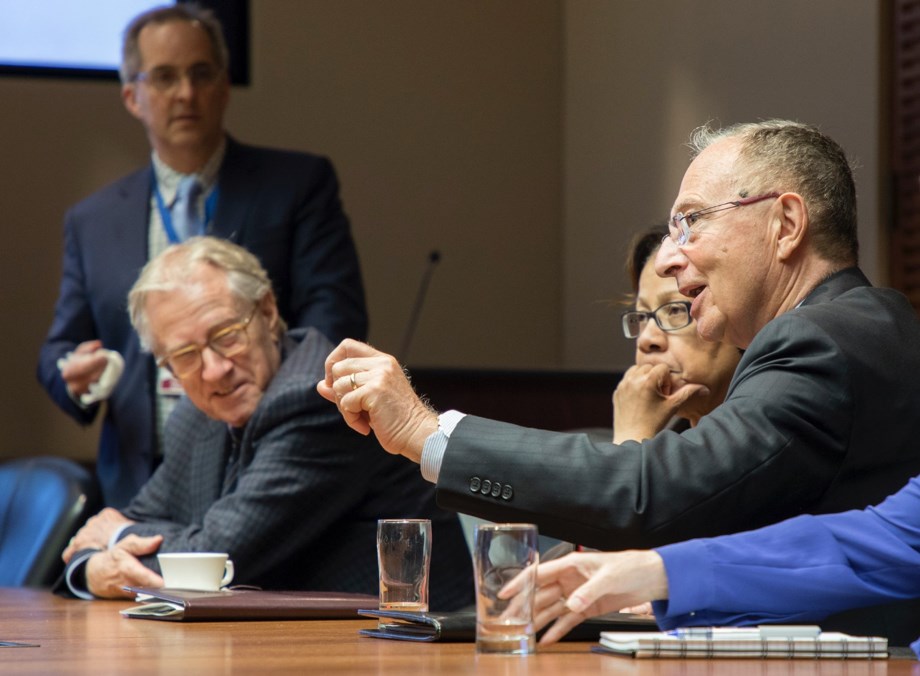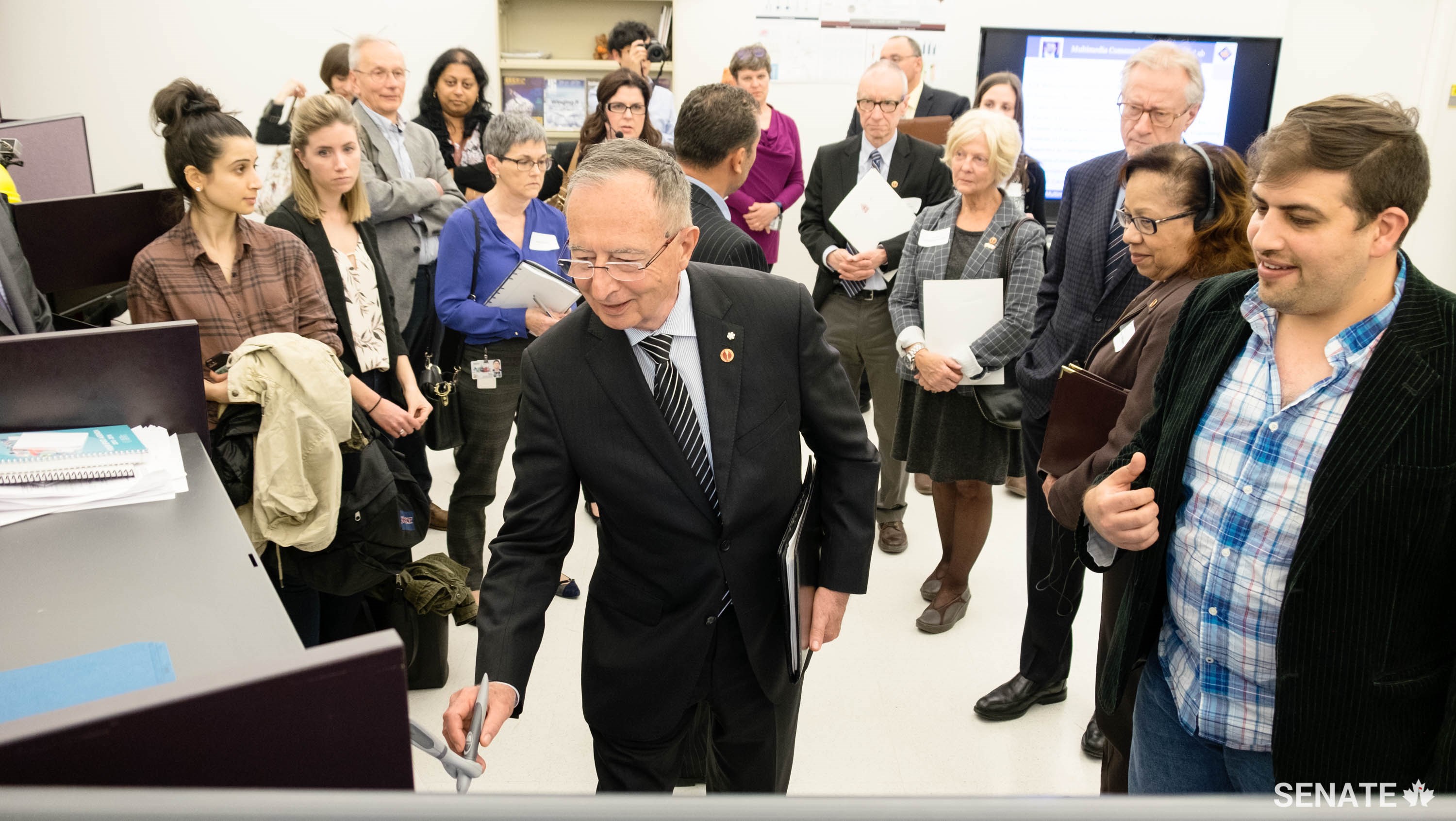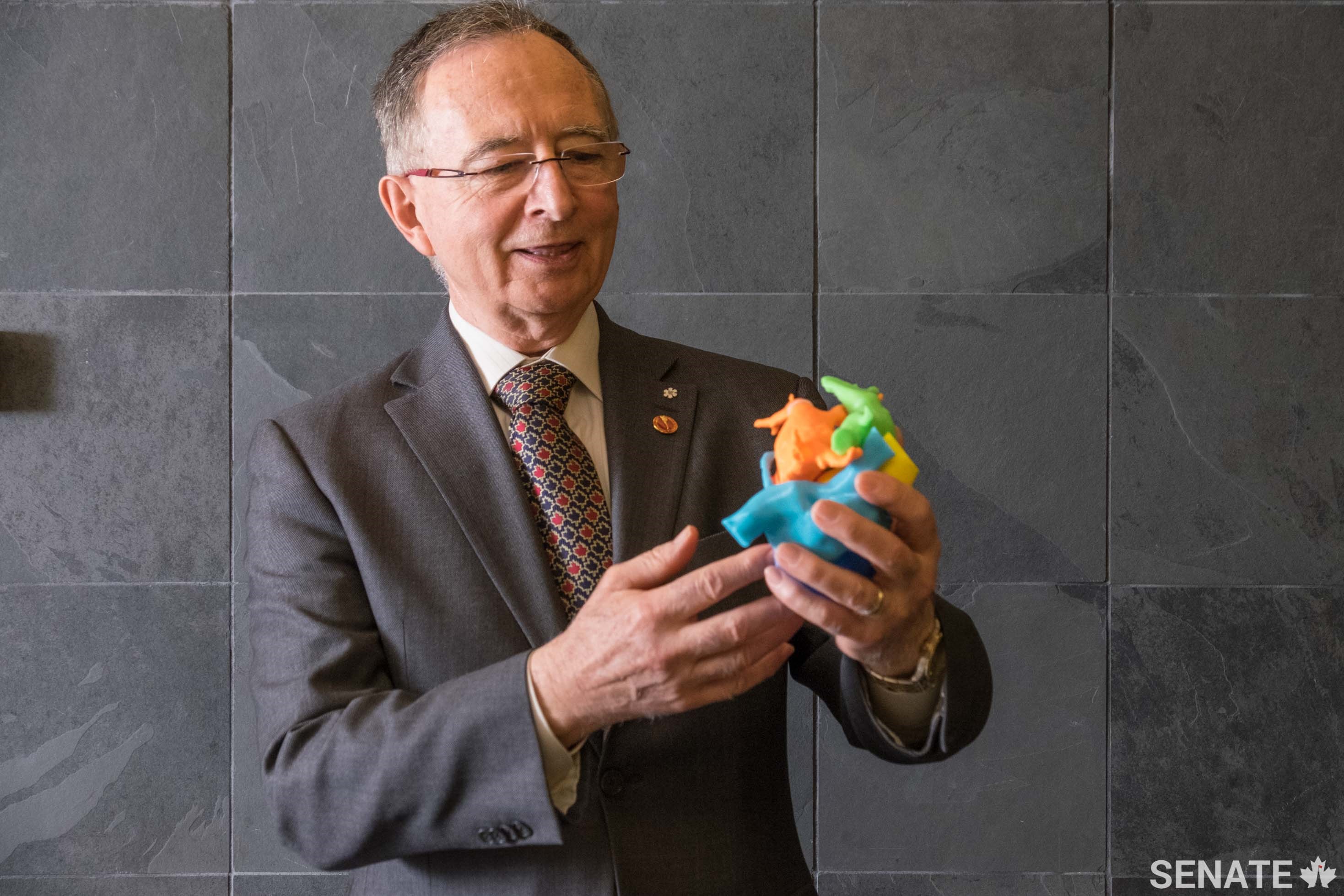‘Understand you are here on behalf of all Canadians,’ says retiring Senator Kelvin Kenneth Ogilvie

Internationally renowned scientist and inventor, Senator Kelvin Kenneth Ogilvie retires from the Senate on November 6, 2017. He was recommended for an appointment to Parliament’s upper house by then-prime minister Stephen Harper in August 2009.
Senator Ogilvie was president and vice-chancellor of Acadia University in Wolfville, Nova Scotia from 1993 to 2003. He is a leading expert on bio-technology, bio-organic chemistry and genetic engineering.
He leaves the Senate as chair of the Standing Committee on Social Affairs, Science and Technology and was co-chair of the Special Joint Committee on Physician Assisted Dying in 2016 and from 2009-2015 was chair of the Health Research Caucus.
In this SenCAplus Q&A, Senator Ogilvie reflects on his time in the Senate.

What were your expectations of the Senate?
I didn’t have any exaggerated expectations. I am a Canadian who has paid attention — an educated Canadian who has always been interested in the evolution of our government and how it works. The Senate plays what I call an executive committee role. I was president of a university so I knew how organizations worked and the role of executive committees. I always thought of the Senate as being the scrutineer of legislation which is enthusiastically passed, often on a partisan basis, by the House of Commons.
Eight years later, and heading into retirement from the Senate, what achievements have you been most proud of?
Without hesitation, I can say being chairman of the committee on physician assisted dying and the report in which we recommended to the government how legislation should be developed to benefit and to protect Canadians. I still read it occasionally and think it was a magnificent report and, ultimately, Canada will have to adopt all the measures and the protections our committee recognized. It was emotional and a challenge but it was also a great privilege to have been part of that committee.
Legislation aside, what have you enjoyed most about working here?
There are several things. The obvious one is the opportunity to be part of studies on important issues facing Canada and the world. It has been tremendously satisfying. As crazy as this world on Parliament Hill is, and as disappointing as it can be, there is a satisfaction in having the opportunity of being part of that.
Have you made many friends since you got here?
I have made some exceptionally good friends across all political boundaries. I have attempted to operate for the benefit of the country from a totally non-partisan point of view — in terms of interacting with people of all parties.

How has your science background informed or helped your career as a senator?
It has been incredibly important and I would like to think beneficial to the work I have done here. When I first arrived, I was astounded to find that I brought an almost unique experience to the Hill — in terms of people with experience in the fundamental sciences. It gave me a depth of knowledge and practice that I was able to bring to the committees I worked on. I was able to see things nobody else would have seen because I’d been there. I knew when somebody was blowing smoke and trying to influence legislation through studies that were not well founded — or in some cases had no correct foundation at all. In most cases, the people who represent major organizations and industries are lobbyists without a science background, representing companies that have products supposedly based on science. So I was able to defrock many things and equally able to support, with knowledge argument, things that were going to be important for the country. I was also able to introduce kiosk events where leading Canadian researchers from the science community came to the Hill to interact with parliamentarians and describe the exciting benefits of their research.
How do you feel about the efforts to modernize the Senate?
I see it largely as a façade. I don’t see much difference in the way the independent senators are voting. They are largely appointed for a common political experience. But I am more concerned about efforts to change the Senate to the point where there is no official opposition. When you look at countries that get into difficulties it is invariably because there is no organized, legitimized official opposition. When a government gets into trouble, there is no experienced alternative to focus the attention of the population. Venezuela was a fairly affluent middle-class society that is now descending into chaos because the government decreased the powers of the opposition. I see the efforts of the current government as efforts to weaken the opposition and in the Senate that is a very clear determination. It is a serious mistake.

If that is the case, what are the implications?
In the minds of those in the House of Commons, they are supreme and the Senate is a nuisance - especially when there is a strong opposition that can bring about changes in government legislation. If you weaken the opposition in the Senate and make it more difficult for a concerted opposition to form, government legislation from the House of Commons will go through unchanged. So as I see it, the effort is to prevent the creation of a solid opposition bloc.
What do you anticipate as the major challenges facing senators for the next 25 years?
The immediate issue is that they will have to learn to work together in the system that is evolving. It will be important for them to understand that their role is a collective one in building the Canadian democracy. That is critical.
If you could give one piece of advice to incoming senators, what would it be?
Understand clearly that you are here on behalf of all Canadians.
What’s next for you?
I have nothing specific planned. I hope to continue to live a healthy life, back home on the edge of The Bay of Fundy.
Read statements from the Senate Chamber about Senator Ogilvie’s retirement.
Related articles
Tags
Committee news
‘Understand you are here on behalf of all Canadians,’ says retiring Senator Kelvin Kenneth Ogilvie

Internationally renowned scientist and inventor, Senator Kelvin Kenneth Ogilvie retires from the Senate on November 6, 2017. He was recommended for an appointment to Parliament’s upper house by then-prime minister Stephen Harper in August 2009.
Senator Ogilvie was president and vice-chancellor of Acadia University in Wolfville, Nova Scotia from 1993 to 2003. He is a leading expert on bio-technology, bio-organic chemistry and genetic engineering.
He leaves the Senate as chair of the Standing Committee on Social Affairs, Science and Technology and was co-chair of the Special Joint Committee on Physician Assisted Dying in 2016 and from 2009-2015 was chair of the Health Research Caucus.
In this SenCAplus Q&A, Senator Ogilvie reflects on his time in the Senate.

What were your expectations of the Senate?
I didn’t have any exaggerated expectations. I am a Canadian who has paid attention — an educated Canadian who has always been interested in the evolution of our government and how it works. The Senate plays what I call an executive committee role. I was president of a university so I knew how organizations worked and the role of executive committees. I always thought of the Senate as being the scrutineer of legislation which is enthusiastically passed, often on a partisan basis, by the House of Commons.
Eight years later, and heading into retirement from the Senate, what achievements have you been most proud of?
Without hesitation, I can say being chairman of the committee on physician assisted dying and the report in which we recommended to the government how legislation should be developed to benefit and to protect Canadians. I still read it occasionally and think it was a magnificent report and, ultimately, Canada will have to adopt all the measures and the protections our committee recognized. It was emotional and a challenge but it was also a great privilege to have been part of that committee.
Legislation aside, what have you enjoyed most about working here?
There are several things. The obvious one is the opportunity to be part of studies on important issues facing Canada and the world. It has been tremendously satisfying. As crazy as this world on Parliament Hill is, and as disappointing as it can be, there is a satisfaction in having the opportunity of being part of that.
Have you made many friends since you got here?
I have made some exceptionally good friends across all political boundaries. I have attempted to operate for the benefit of the country from a totally non-partisan point of view — in terms of interacting with people of all parties.

How has your science background informed or helped your career as a senator?
It has been incredibly important and I would like to think beneficial to the work I have done here. When I first arrived, I was astounded to find that I brought an almost unique experience to the Hill — in terms of people with experience in the fundamental sciences. It gave me a depth of knowledge and practice that I was able to bring to the committees I worked on. I was able to see things nobody else would have seen because I’d been there. I knew when somebody was blowing smoke and trying to influence legislation through studies that were not well founded — or in some cases had no correct foundation at all. In most cases, the people who represent major organizations and industries are lobbyists without a science background, representing companies that have products supposedly based on science. So I was able to defrock many things and equally able to support, with knowledge argument, things that were going to be important for the country. I was also able to introduce kiosk events where leading Canadian researchers from the science community came to the Hill to interact with parliamentarians and describe the exciting benefits of their research.
How do you feel about the efforts to modernize the Senate?
I see it largely as a façade. I don’t see much difference in the way the independent senators are voting. They are largely appointed for a common political experience. But I am more concerned about efforts to change the Senate to the point where there is no official opposition. When you look at countries that get into difficulties it is invariably because there is no organized, legitimized official opposition. When a government gets into trouble, there is no experienced alternative to focus the attention of the population. Venezuela was a fairly affluent middle-class society that is now descending into chaos because the government decreased the powers of the opposition. I see the efforts of the current government as efforts to weaken the opposition and in the Senate that is a very clear determination. It is a serious mistake.

If that is the case, what are the implications?
In the minds of those in the House of Commons, they are supreme and the Senate is a nuisance - especially when there is a strong opposition that can bring about changes in government legislation. If you weaken the opposition in the Senate and make it more difficult for a concerted opposition to form, government legislation from the House of Commons will go through unchanged. So as I see it, the effort is to prevent the creation of a solid opposition bloc.
What do you anticipate as the major challenges facing senators for the next 25 years?
The immediate issue is that they will have to learn to work together in the system that is evolving. It will be important for them to understand that their role is a collective one in building the Canadian democracy. That is critical.
If you could give one piece of advice to incoming senators, what would it be?
Understand clearly that you are here on behalf of all Canadians.
What’s next for you?
I have nothing specific planned. I hope to continue to live a healthy life, back home on the edge of The Bay of Fundy.
Read statements from the Senate Chamber about Senator Ogilvie’s retirement.


